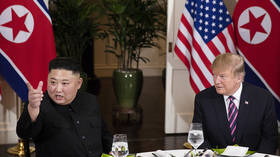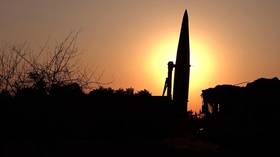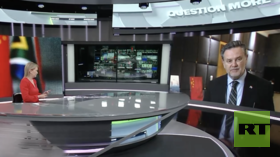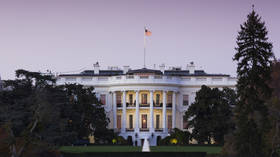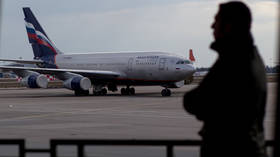Coverage of India-Pakistan crisis by mainstream media is strangely objective. What's going on?
I've been trying to make up my mind about how concerned I should be about events in Kashmir, nothing causes pause for thought like two nuclear powers launching airstrikes against one another.
There's something about the human mind, or at least mine, which causes it to immediately jump to the worst case scenario, especially when it's fuelled by ignorance.
So, this is what my brain does when it hears that India and Pakistan have been firing missiles at each other and shooting each other's planes out of the sky.
First it accesses everything it knows about the situation in Kashmir, which can be summed up as "India and Pakistan don't like each other very much, and they both have nuclear missiles."
My imagination then uses that information to form a conclusion, which in this case is "we'll probably all be vaporised by Monday lunchtime."
Also on rt.com Could Indian MiG-21 have downed Pakistani F-16? Military expert says it’s up to pilot, not planeEven for me that conclusion seemed a little extreme, so I thought I might dive into the details a little bit more, see if I could work out what was actually going on before cancelling the appointments I had for Tuesday. At the very least I wanted to know who I should be blaming if anyone started pushing me for an opinion. I find acquiring opinions much more convenient than forming them.
However, the general coverage of this possible nuclear confrontation has confused me. Most broadcast outlets and newspapers (newspapers are like paper versions of websites, ask your grandad about them) did cover the story, and most mentioned quite high up in their coverage the potential for nuclear catastrophe, so that was reassuring.
However, hardly anyone in the mainstream media that I could find had it as a lead story until Friday, when Pakistan shot down a couple of Indian fighter jets and it had become hard to ignore.
I took solace in the fact that in the eyes of much of the commentariat, a disastrous nuclear confrontation didn't seem as important as Donald Trump's disgraced former lawyer calling him names, or that Brexit, erm, something about Brexit.
Paradoxically negotiations in Vietnam over North Korea's nuclear programme that probably doesn't threaten much, beyond the underground caves it's tested in, dominated most headlines.
I fully understand that decision though, because even if I saw a mushroom cloud on the horizon, I would probably still be mainly thinking about the weird spectacle of Trump and Kim Jong Un negotiating on behalf of large parts of humanity.
Still, isn't it a little strange that the very real risk of actual nuclear war, possibly by the weekend, isn't the top headline everywhere?
Surely, I thought, there will be some juicy op-eds out there, accusing one side of geopolitical villainy. Again, I was to be disappointed, because when it came to an India-Pakistan confrontation there seemed to be an unlikely outbreak of objectivity.
To name just a few, the Times of London suggested both sides shared the blame, and so did the Telegraph. The New York Times decided to cover the story by decrying people using social media in times of tension. I combed the media (well, not the media in India and Pakistan where it was a different story) and I couldn't find anyone who was blatantly demonising just one side, or telling me who the good guys were and who the bad guys were. What was going on? This isn't the media I rely on!
Even world leaders seemed to have been chatting in their WhatsApp group about what they should say, and agreed they would all call for "restraint." That's it. Everyone, the same word. The US and Iran, China and Britain.
Also on rt.com From F-16s & Russian MiGs to old French planes: What India & Pakistan can unleash in air combatAnd then I noticed a curious thing among the emerging details. There had been some confusion about what planes each side had been using in the tit-for-tat attacks on each other.
There was speculation over whether India had used the planes it had bought from France or the ones it had bought from Russia. And whether Pakistan had used its US-made F-16s, or its Chinese jets.
And it all became clear! India and Pakistan are key allies of pretty much everyone apart from each other. India has lots of cash, and Pakistan has lots of access to extremely useful spy networks.
In a situation like this, it's really hard for the media to know who they're allowed to blame, governments aren't telling them who to demonize and that makes it hard for the usual invective to spew forth.
You won't struggle to find opinion pieces on who is to blame in Venezuela or Syria for example, but with Kashmir there has been a torrent of balanced factual reporting. Imagine that.
Objective reporting, a joint international call for restraint. This Kashmir crisis may hold important lessons for us all… if we're still here after Monday.
Think your friends would be interested? Share this story!
The statements, views and opinions expressed in this column are solely those of the author and do not necessarily represent those of RT.

